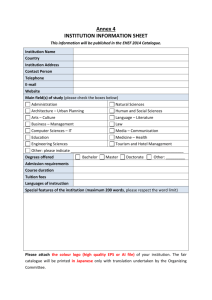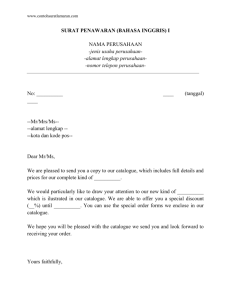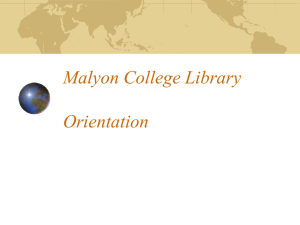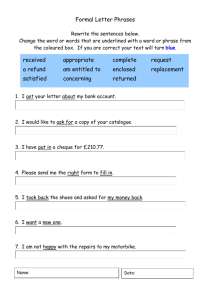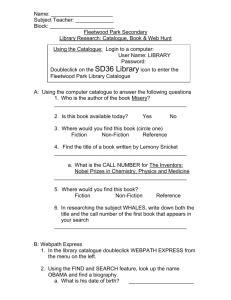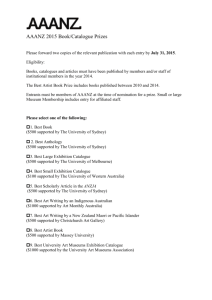University of Limpopo Turfloop Campus Library
advertisement
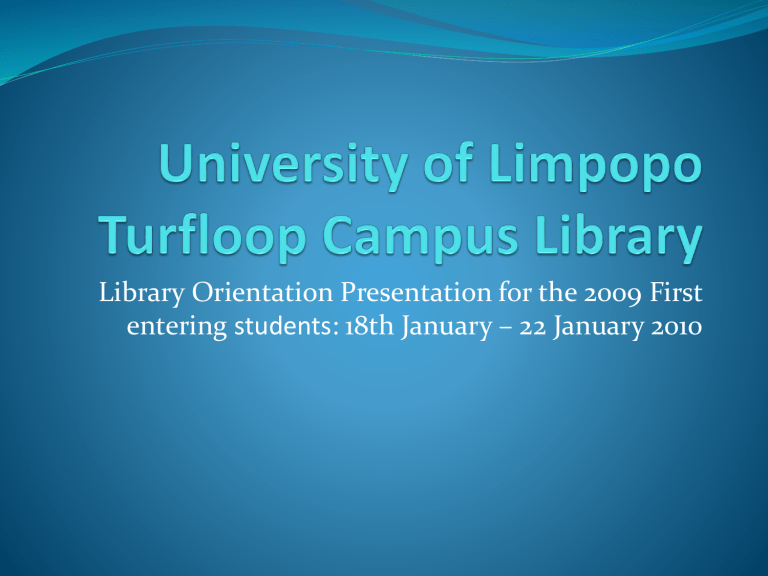
Library Orientation Presentation for the 2009 First entering students: 18th January – 22 January 2010 Objectives of the presentation To introduce you to UL Library and its resources, floor plan, study rooms and other important areas To inform you about library hours, rules, regulations and policies that you should adhere to To show you the service areas where you can get help To introduce you to the library online catalogue that will lead to the basic materials To show you the shelving areas and the organization of materials on the shelves To encourage you to use the library regularly What is a library? The library is a collection of information sources organized for effective use These information sources include books, journals, CD Roms, Videos and the Internet The University library is the main supplier of these resources to support learning, study and research The University library is thus referred to as the Heart of the University LIBRARY SCIENCES, HEALTH & AGRIC MANAGEMENT SCIENCES & LAW HUMANITIES SCHOOLS Layout of the University of Limpopo Library North Wing which is the 24 hours reading room commonly known as Lapologa East Wing which consists of Ground Floor and first floor Ground Floor: Photocopy section, Circulation, Reserve and Information Desk West wing which consists of: Ground Floor: Africana Collection First Floor: Law Collection Second Floor: Government Documents Collection Third Floor: Sciences, Health and Agriculture Collection Fourth Floor: Accounting, Economics and Management Sciences Collection Library Hours During term Monday - Thursday: From 07h30 – 22h00 Friday: 07h30 – 16h30 Saturday: 08h00 – 16h00 During holidays Monday - Friday: 07h30 – 16h30 Sunday and Public Holiday: Closed Information Desk For any information query that you have, please consult the librarian at the information Desk. This is a service area where information is provided. Finding books in the library To find books in the library, always use the library catalogue The library catalogue is the key to the library collection It list all the information sources the library has acquired Its purpose is to provide you with the location number The location number is used to trace books on the shelves The UL library uses the Online Catalogue How to search the Online Library Catalogue If the Computer is off. Switch it on and Enter your USERNAME Enter your PASSWORD Click on START button on the PC Click on PROGRAMS Click on INTERNET EXPLORER Then go to the University website www.ul.ac.za Click on Libraries Click again on Online Catalogue The following Screen will appear SEARCH THE CATALOGUE Library Information View Your Patron Record Suggestions for the Library Books the Library should Acquire Other Libraries via Z39.50 Searching books from the catalogue Click on SEARCH THE CATALOGUE There are several ways or entries through which the catalogue may be searched by the: *Author of a book *Title of a book *Subject * Words in title etc This entries may be chosen from the following screen after clicking on SEARCH THE CATALOGUE Search the Library Catalogue by: AUTHOR TITLE SUBJECT (LC) MEDICAL subject WORDS in title CALL NUMBER AUTHOR/TITLE JOURNAL title RETURN TO MAIN MENU Searching the catalogue Choose the entry on which you would like to search for a book Type in either the author ‘s surname and initials, the title or subject of the book and press the enter key A call number will appear, e.g. 320.968 ADA Write it down so that you should not forget it and proceed to the shelves The call number is the number that you are going to use to locate a book on the shelves The call number is written on the spine of the book If the book is so thin that the call number may not fit on the spine, it is written on the front cover of the book Finding books on the shelves When you arrive at the shelves, please take note of the shelf guides that are pasted on the top corner of each shelf The shelf guides indicate the range of call numbers within a particular shelf, e.g., 320.1 – 325.222 The books on the shelves are arranged from left to right and from top to bottom within the shelf units The books are arranged numerically by call numbers, followed by the first three alphabets of the Author ‘s surname, e.g. 321.5 SHA After locating a book from the shelves, you may use it in the library or proceed to circulation desk to borrow it. Circulation Desk This is where books are borrowed for a specified period and returned after use Under-graduate students are allowed to borrow a maximum of five (5) books for fourteen (14) days Post-graduate students can borrow eight (8) books for thirty (30) days Please always check the return date on the date slip Failure to return books on or before the due date will result in a fine of R1, 00 per book per day, which accumulates according to the number of days kept Renewal of a book is allowed, only if nobody has placed a hold on it. The library, however, reserves the right to recall the book if it is on demand Reserve Desk Scarce and frequently used books/pamphlets/newspapers are put at the Reserve / Short loans section by lecturers/library staff. There are four short loan areas in UL library, namely, General Reserve, Africana, Law and Government Documents At these sections you are allowed to borrow two (2) books/ pamphlets at a time for two (2) hours Extension of loan period is also allowed in case the books is not in demand At the General Reserve, you are also allowed to borrow books for overnight and over weekends Booking in advance is required for overnight and over weekend loans Reference Materials In case you require information on a given topic/assignment or need a definition of a word, a Reference Source is an ideal source to consult. Reference sources include dictionaries, encyclopedias, atlases, maps, etc. These sources are to be used within the library only. However, you are allowed to make copies in the Photocopy section. PHOTOCOPY The photocopy machines are card operated. These cards are sold in the Photocopy section. Please ensure that you deposit enough money into your photocopy card to be able to make copies. Photocopying rules and regulations must always be observed. IMPORTANT THINGS TO REMEMBER Always consult the Library Catalogue. Always have a call number when going to the shelves. Always produce a valid student card when borrowing materials. Always return books on time to avoid penalties. IF YOU NEED HELP IN ANY PART OF THE LIBRARY ASK THE LIBRARY STAFF THANK YOU
